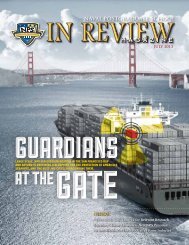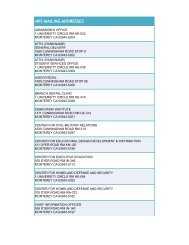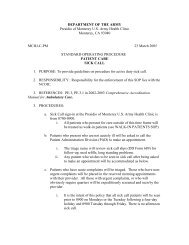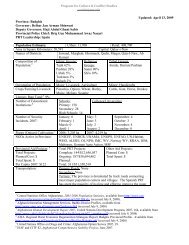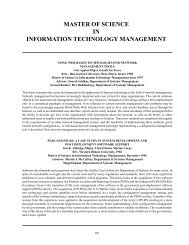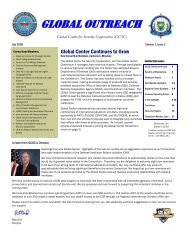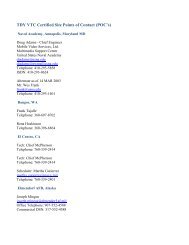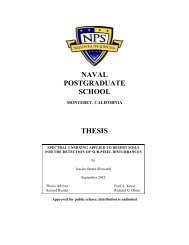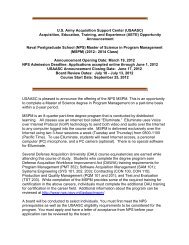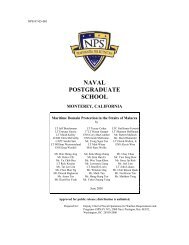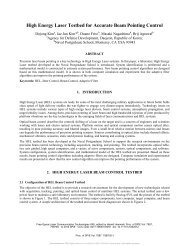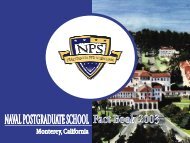October 2000 Newsletter - Naval Postgraduate School
October 2000 Newsletter - Naval Postgraduate School
October 2000 Newsletter - Naval Postgraduate School
Create successful ePaper yourself
Turn your PDF publications into a flip-book with our unique Google optimized e-Paper software.
STUDENT RESEARCH<br />
INTELLIGENT AGENTS FOR NAVY ACQUISITION INNOVATION<br />
LCDR David N. Fowler, United State Navy<br />
Master of Science in Management-December 1999<br />
Advisor: Assistant Professor Mark E. Nissen, Department<br />
of Systems Management<br />
Information technology has advanced to the point at which<br />
software agents can be developed to represent people in their<br />
conduct of business processes. Enabled by a modicum of<br />
artificial intelligence, such software artifacts are termed<br />
intelligent agents, and recent thesis work by <strong>Naval</strong> <strong>Postgraduate</strong><br />
<strong>School</strong> (NPS) faculty and thesis students is applying this<br />
advanced technology to the acquisition domain. The<br />
students are building on research conducted by Assistant<br />
Professor Mark Nissen, who has long been investigating<br />
process innovation through knowledge technologies such as<br />
intelligent agents. Their work is inspired, in part, by a proofof-concept<br />
agent application called The Intelligent Mall,<br />
which demonstrates the use of intelligent agents to automate<br />
key aspects of the enterprise supply chain.<br />
In his thesis effort, entitled Innovating the Standard<br />
Procurement System Utilizing Intelligent Agent Technologies,<br />
LCDR David Fowler, USN, examines opportunities for<br />
agents to innovate the Navy acquisition process. Acquisition<br />
activities—such as procurement, contracting and logistics—<br />
are becoming increasingly important, as the Navy and other<br />
services strive to shorten the cycle time required for weapon<br />
system development and be more responsive to warfighter<br />
needs in the field. At present, the acquisition process is timeconsuming,<br />
expensive and labor-intensive, with a mixed<br />
record of satisfying warfighter needs.<br />
The current DoD approach to this problem is to pursue<br />
development and implementation of what is referred to as<br />
the Standard Procurement System (SPS), which is a large<br />
software application used to enable workflow capabilities in<br />
support of the procurement and contracting processes. SPS<br />
provides some capability for paperless contracting and<br />
possesses the necessary infrastructure to begin a transition to<br />
electronic business. For instance, it replaces paper forms<br />
(e.g., purchase requests, requests for quotation, purchase<br />
orders) with electronic counterparts and automatically<br />
routes such work products to various people in the organization<br />
(e.g., requestors, managers, contract specialists).<br />
However, as a relatively novel information system implementation,<br />
SPS remains quite crude and has limited functionality.<br />
And this information system is being implemented<br />
worldwide without first redesigning the underlying procure-<br />
ment and contracting processes.<br />
The objective of this thesis is to identify avenues for<br />
emerging agent technologies to innovate the acquisition<br />
process, with the goal of enabling order-of-magnitude gains<br />
in performance (esp. cost and cycle time).<br />
LCDR Fowler acquired considerable acquisition expertise<br />
as a student at NPS, where he was exposed to SPS. He<br />
leveraged this knowledge and exposure to investigate the<br />
potential role that intelligent agents could play in process<br />
redesign. He also acquired familiarity with the capabilities of<br />
the Intelligent Mall, in order to ground his analysis in agent<br />
capabilities that are becoming available today. Using the<br />
Davenport-Nissen framework for process analysis, he<br />
conducted a detailed examination of the Federal Acquisition<br />
Process and identified many serious pathologies, along with<br />
numerous process activities the SPS fails to support. He then<br />
employed a four-step method for evaluating agent potential,<br />
which he used to identify and rank-order several acquisition<br />
process activities with particularly-good potential for automation<br />
and support through intelligent agent technology.<br />
Each of these was in turn evaluated in the context of two<br />
process redesign alternatives, both of which offer excellent<br />
opportunity for the kinds of quantum performance gains<br />
desired through innovation.<br />
Several key results emerge from this thesis research. First,<br />
the current DoD approach (i.e., SPS) is seriously flawed.<br />
Although SPS represents a step in the right direction (e.g.,<br />
moving toward paperless contracting), the underlying<br />
acquisition process it supports remains inefficient, and laying<br />
SPS on top of this existing process is expected to make cost<br />
and cycle time increase. Second, agent technology that is<br />
available today offers excellent potential to enable quantum<br />
performance improvements in Navy acquisition processes.<br />
And such agent technology can be developed to integrate<br />
with SPS and other existing Navy systems, thereby leveraging<br />
the investment already made in such systems. Third,<br />
restructuring the underlying acquisition process—in addition<br />
to developing systems for support—offers great potential<br />
for performance improvement and lies within the<br />
authority of Navy leaders to undertake. Fourth, because<br />
agent technology continues to develop and mature, not all<br />
acquisition process activities should necessarily be addressed<br />
by agents at the present time. Rather, the thesis identifies<br />
those near-term process activities (e.g., market research) that<br />
offer the best potential for agent-based support today, along<br />
--continued on page 24<br />
NPS Research page 23<br />
<strong>October</strong> <strong>2000</strong>



